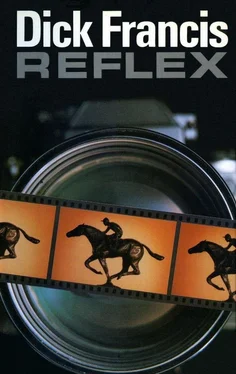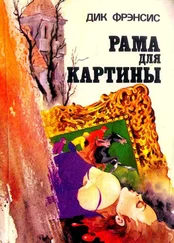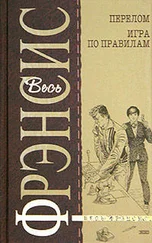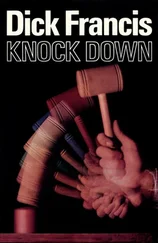She hasn’t the same father as Philip, so you couldn’t hate her for the same reasons, and if you’d see her you’d love her, but even if you won’t see her, please, Mother, look after her. I’ll hope to hear from you soon. Please, please, Mother, answer this letter.
Your daughter,
Caroline.
Staying at Pine Woods Lodge,
Mindle Bridge, Sussex.
I looked up and across at the hard old woman.
‘When did she write this?’
‘Years ago.’
‘And you didn’t reply,’ I said flatly.
‘No.’
I supposed it was no good getting angry over so old a tragedy. I looked at the envelope to try to see the date of the letter from the postmark, but it was smudged and indecipherable. How long, I wondered, had she waited at Pine Woods Lodge, hoping and caring and desperate. Desperation, of course, when it concerned my mother, was always a relative term. Desperation was a laugh and an outstretched hand — and the Lord (or Deborah or Samantha or Chloe) would provide. Desperation wouldn’t be grim and gritty: but it must have been pretty deep to make her ask her own mother for help.
I put the letter, the envelope and the photograph in my jacket pocket. It seemed disgusting to me that the old woman had kept them all these years when she had ignored their plea, and I felt in an obscure way that they belonged to me, and not her.
‘So you’ll do it,’ she said.
‘No.’
‘But you’re taking the photograph.’
‘Yes.’
‘Well, then.’
‘If you want... Amanda... found, you should hire a private detective.’
‘I did,’ she said impatiently. ‘Naturally. Three detectives. They were all useless.’
‘If three failed, she can’t be found,’ I said. ‘There’s no way I could succeed.’
‘More incentive,’ she said triumphantly. ‘You’ll try your damnedest, for that sort of money.’
‘You’re wrong.’ I stared bitterly at her across the room and from her pillow-piled bed she stared as unsmilingly back. ‘If I took any money from you I’d vomit.’
I walked over to the door and this time opened it without hesitation.
To my departing back she said, ‘Amanda shall have my money... if you find her.’
When I went back to Sandown Park the following day the letter and photograph were still in my pocket but the emotions they had engendered had subsided. The unknown half-sister could be contemplated without infantile rage, and yet another chunk of the past had fallen into place.
It was the present, in the shape of Steve Millace, which claimed everyone’s attention. He came steaming into the changing room half an hour before the first race with drizzle on his hair and righteous fury in his eyes.
His mother’s house, he said, had been burgled while they were all out at his father’s funeral.
We sat in rows on the benches, half changed into riding clothes, listening with shock. I looked at the scene — jockeys in all stages of undress, in underpants, bare-chested, in silks and pulling on nylon tights and boots, and all of them suddenly still, as if in suspended animation, listening with open mouths and eyes turned towards Steve.
Almost automatically I reached for my Nikon, twiddled the controls, and took a couple of photographs: and they were all so accustomed to me doing that sort of thing that no one took any notice.
‘It was awful,’ Steve said. ‘Bloody disgusting. She’d made some cakes and things, Mum had, for the aunts and everyone, for when we got back from the cremation, and they were all thrown around the place, squashed flat, jam and such, onto the walls, and stamped into the carpet. And there was more mess everywhere, in the kitchen... bathroom... It looked as if a herd of mad children had rampaged round the whole house making it as filthy as they could. But it wasn’t children... children wouldn’t have stolen all that was taken, the police said.’
‘Your mother have a load of jewels, did she?’ said someone, teasing.
One or two laughed and the first tension was broken, but the sympathy for Steve was genuine enough, and he went on talking about it to anyone who cared to listen: and I did listen, not only because his peg at Sandown was next to mine, which gave me little choice, but also because we always got on well together in a day-to-day, superficial way.
‘They stripped Dad’s darkroom,’ he said. ‘Just ripped every-thing out. And it was senseless... like I told the police... because they didn’t just take things you could sell, like the enlarger and the developing stuff, but all his work, all those pictures taken over all those years, they’re all gone. It’s such a bloody shame. There’s Mum with all that mess, and Dad dead, and now she hasn’t even got what he spent his life doing. Just nothing. And they took her fur jacket and even the scent Dad gave her for her birthday, that she hadn’t opened, and she’s just sitting there crying...’
He stopped suddenly and swallowed, as if it was all too much for him too. At twenty-three, although he no longer lived with them, he was still very much his parents’ child, attached to them with a difficult loyalty most people admired. George Millace himself might have been widely disliked, but he had never been belittled by his son.
Small-boned, slight in build, Steve had bright dark eyes and ears that stuck out widely, giving him an overall slightly comic look: but in character he was more intense than humorous, and was apt, even without so much cause as on that day, to keep on returning obsessively to things which upset him.
‘The police said that burglars do it for spite,’ Steve said ‘...mess up people’s houses and steal their photographs. They told Mum it’s always happening. They said to be thankful there wasn’t urine and shit over everything, which there often was, and she was lucky she didn’t have the chairs and settee slashed and all the furniture scratched.’ He went on compulsively talking to all comers, but I finished changing and went out to ride in the first race, and more or less forgot the Millace burglary for the rest of the afternoon.
It was a day I had been looking forward to, and trying not to, for nearly a month. The day that Daylight was to run in the Sandown Handicap Pattern ’Chase. A big race, a good horse, moderate opposition, and a great chance of winning. Such combinations came my way rarely enough to be prized, but I never liked to believe in them until I was actually on my way down to the post. Daylight, I’d been told, had arrived at the course safe and sound, and for me there was just the first race, a novice hurdle, to come back unscathed from, and then, perhaps, I would win the big Pattern ’Chase and half a dozen people would fall over themselves to offer me the favourite for the Gold Cup.
Two races a day was about my usual mark, and if I ended a season in the top twenty on the jockeys’ list, I was happy. For years I’d been able to kid myself that the modesty of my success was due to being taller and heavier than was best for the job. Even with constant semi-starvation I weighed ten stone seven stripped, and was cut off, consequently, from the countless horses running at ten stone ten or less. Most seasons I rode in about two hundred races with forty or so winners, and knew that I was considered ‘strong’, ‘reliable’, ‘good over fences’, and ‘not first class in a close finish’.
Most people think, when they’re young, that they’re going to the top of their chosen world, and that the climb up is only a formality. Without that faith, I suppose, they might never start. Somewhere on the way they lift their eyes to the summit and know they aren’t going to reach it; and happiness then is looking down and enjoying the view they’ve got, not envying the one they haven’t. At around twenty-six I’d come to terms with the view I’d reached, and with knowing I wasn’t going any further: and oddly, far from depressing me, the realisation had been a relief. I’d never been graspingly ambitious, but only willing to do anything as well as I could. If I couldn’t do better, well, I couldn’t, and that was that. All the same, I’d no positive objection to having Gold Cup winners thrust upon me, so to speak.
Читать дальше




